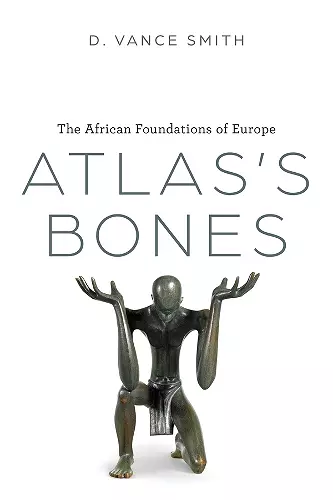Atlas's Bones
The African Foundations of Europe
Format:Hardback
Publisher:The University of Chicago Press
Publishing:29th Dec '25
£30.00
This title is due to be published on 29th December, and will be despatched as soon as possible.

A major new look at Africa’s influence on European culture and how colonization remade Africa in the image of a medieval Europe.
Virgil. Chaucer. Petrarch. These names resonate with many as cornerstones of European culture. Yet, in Atlas’s Bones, D. Vance Smith reveals that much of what is claimed as European culture up to the Middle Ages—its great themes in literature, its sources in political thought, its religious beliefs—originated in the writings of African thinkers like Augustine, Fulgentius, and Martianus Capella, or Europeans who thought extensively about Africa. In fact, a third of Virgil’s Aeneid takes place in Africa. Francis Petrarch believed his most important achievement was his epic Africa; while Geoffrey Chaucer wrote repeatedly about the figures of Scipio Africanus, actually two different men who defeated and destroyed Carthage.
Smith tells the story of how Europe created a false “medieval” version of Africa to acquire resources and power during the era of imperialism and colonialism. The first half of the book, “Reading Africa,” traces Egypt’s, Libya’s, and Carthage’s influence on classical and medieval thinking about Africa, highlighting often ignored literary and legendary traditions, for example, that Alexander the Great named himself the son of an African god. The second part, “Writing Africa,” focuses on how the different cultures of the two great African cities—Carthage and Alexandria—shaped modern literary criticism and political theology and examines the cross-influences of modern anthropology, medieval studies, and colonial law.
Atlas’s Bones firmly re-establishes the significance of Africa in European intellectual history. It will be essential reading for anyone seeking to understand how much of Africa informs our artistic and cultural world.
“A fascinating exploration of the place of Africa and Africans in the intellectual life of classical Europe, its later erasure, and some of the consequences in the making of the cultures of Empire.” -- Kwame Anthony Appiah, author of 'The Lies That Bind: Rethinking Identity '
“Smith finds that medieval European literature relies on knowledge of a real (not just a mythic) Africa and writings by Africans, and his invitation to reorient our understanding of the relationship between continents is both provocative and persuasive. His compelling challenge to the use of a false ‘medieval’ to support racial hierarchies and conquest is important for historians, literary scholars, and everyone seeking to better understand the world as it was and as it is.” -- David M. Perry, coauthor of 'The Bright Ages: A New History of Medieval Europe'
“This brilliant book affirms that Africa has never been alien to Europe. European self-understanding has always depended upon its southern neighbor, and yet Europe has regarded Africa as a place perennially medieval, in need of neo-feudal law, and incapable of comprehending modernity. Smith expertly guides us through this tangled web of mutual indebtedness and pseudo-feudal mystification. A landmark achievement.” -- David Wallace, author of 'Europe: A Literary History, 1348–1418'
“We live in an exciting historical moment in medievalist scholarship. While two decades ago Euromedievalists hardly noticed the vast world outside Latin Christendom, an increasing number of scholarly studies today are unearthing the crucial debts that Euromedieval literature, history, and thought owe to Afro-Asian worlds. Atlas’s Bones, in particular, treating literary history, philosophy, and medievalism through nine expansive chapters, will surely be one of the new studies that will be read for a long time.” -- Geraldine Heng, author of 'The Invention of Race in the European Middle Ages'
ISBN: 9780226830308
Dimensions: 229mm x 152mm x 28mm
Weight: 680g
432 pages